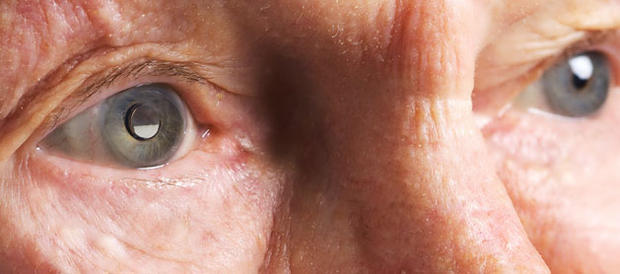FDA: Mini Eye Telescope Implant Can Bring Sight To Blind
WASHINGTON (CBS/AP) It may sound like a James Bond gadget, but the FDA has just approved a miniature telescope - smaller than a pea - that can help with a leading cause of blindness for seniors when implanted inside the eye.
How does it work?
Surgeons put the Implantable Miniature Telescope in one eye, allowing the person to improve central vision for tasks like reading, watching TV and recognizing faces. Doctors leave the other eye alone to provide peripheral vision.
The trick here is that the brain must fuse the two different views into a single image. The Food and Drug Administration says patients will need post-surgery rehabilitation to make that happen.
The invention doesn't work for everyone.
According to Dr. Malvina Eydelman, the FDA's ophthalmic devices chief, the device is specifically geared for a subset of the nearly 2 million Americans with advanced macular degeneration - those 75 and older, with a certain degree of vision loss, who also need a cataract removed.
In a 219-patient study, the FDA said 90 percent of telescope recipients had their vision improve by at least two lines on an eye chart, and three-quarters went from severe to moderate vision impairment.
It's not a miracle cure cautioned ophthalmic surgeon Dr. Kathryn Colby of Harvard and the Massachusetts Eye and Ear Infirmary in Boston
"We're not giving people back 20-year-old eyes," she said.
But by magnifying images onto more of the retina than its diseased center, someone who before couldn't see an entire face might now miss only the nose, said Colby, who helped lead manufacturer VisionCare Ophthalmic Technologies' study of the implant.
And it's not risk free.
Concern about damage to the inside lining of the cornea, the eye's clear front covering that helps focus light, held up FDA approval for several years. In that study, 10 eyes had serious corneal swelling, five that required corneal transplants. FDA's Eydelman said the company proposed candidate restrictions to minimize that risk, and will study how an additional 770 recipients fare after sales begin.
In fact, the FDA took the highly unusual step of requiring that patients and their surgeons sign a detailed "acceptance of risk agreement" before surgery, acknowledging potential side effects -- including corneal damage and worsened vision -- and the need for lots of testing to determine who's a candidate.
VisionCare, of Saratoga, Calif., is seeking Medicare coverage for the surgery and rehab costs, a package that it calls CentraSight. The company wouldn't estimate total costs but said the device itself costs $15,000.
